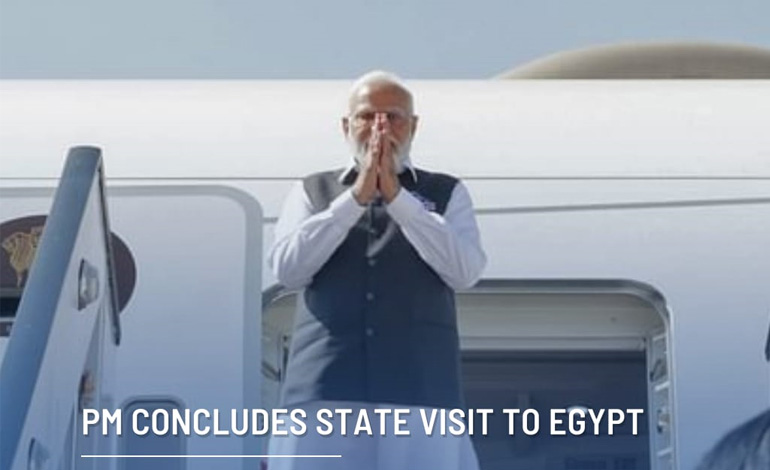In a significant step towards enhancing diplomatic relations, the Prime Minister recently concluded his state visit to Egypt. The visit, marked by fruitful discussions and agreements, aimed to strengthen the ties between the two nations on various fronts. This blog explores the key highlights of the visit, shedding light on the importance of such diplomatic engagements and the potential impact they hold for both countries.
Enhancing Economic Cooperation:
One of the primary objectives of the Prime Minister's visit was to foster economic cooperation between India and Egypt. Both nations recognize the vast potential for collaboration in sectors such as trade, investment, and technology. Several bilateral agreements were signed during the visit, promoting mutual investments and facilitating trade exchanges. These agreements are expected to open up new avenues for businesses and entrepreneurs, creating a win-win situation for both economies.
Cultural Exchanges and People-to-People Contacts:
Diplomatic visits serve as platforms for cultural exchanges and strengthening people-to-people contacts. During the visit, the Prime Minister and his Egyptian counterparts emphasized the importance of cultural ties and the need to promote tourism between the two countries. By encouraging cultural exchanges, tourism, and educational collaborations, India and Egypt can deepen their understanding of each other's rich heritage and promote a more robust and harmonious relationship.
Security Cooperation and Counterterrorism Efforts:
Given the global challenges of terrorism and security threats, both India and Egypt understand the significance of cooperation in this domain. The visit witnessed discussions on enhancing security cooperation, intelligence sharing, and joint efforts to combat terrorism. By working closely together, the two countries can contribute to regional and global peace, stability, and the eradication of extremist ideologies.
Exploring Strategic Partnerships:
India and Egypt have a shared interest in regional stability and progress. The visit emphasized the exploration of strategic partnerships, particularly in areas such as defense, energy, agriculture, and healthcare. Collaboration in these sectors can lead to technological advancements, knowledge-sharing, and capacity building, benefiting both nations and contributing to their respective development goals.
Strengthening Multilateral Engagement:
Diplomatic visits provide opportunities for leaders to engage in multilateral forums and strengthen their positions on global issues. During his visit, the Prime Minister actively participated in various international meetings, conveying India's perspectives on crucial matters. This engagement not only boosts India's presence on the global stage but also reinforces its commitment to working together with nations like Egypt to address common challenges and build a more inclusive and prosperous world.
Conclusion:
The recently concluded state visit of the Prime Minister to Egypt marked a significant milestone in the bilateral relations between India and Egypt. Through discussions, agreements, and commitments, both nations have demonstrated their intent to strengthen cooperation across various sectors. The visit highlighted the importance of economic ties, cultural exchanges, security cooperation, strategic partnerships, and multilateral engagement. As the two countries move forward, it is expected that the outcomes of this visit will lay the foundation for deeper and more fruitful collaboration, benefiting the people of both nations and contributing to regional and global stability.





